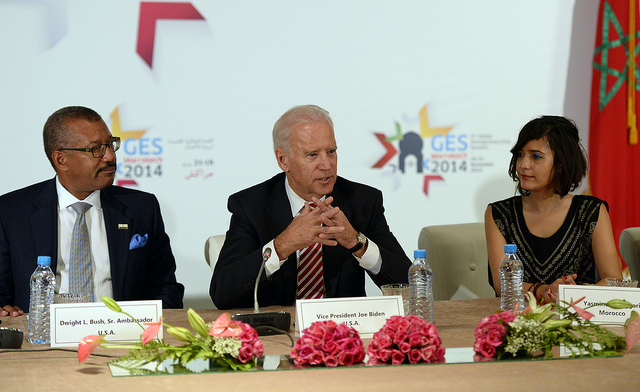Updated
Green Entrepreneurship in Morocco – Jean R. AbiNader
Can a Well-Meaning Project do More with Less?


Jean R. AbiNader, Exec. Dir., Moroccan American Trade and Investment Center
Morocco is a popular topic among US development companies competing for American foreign assistance funding to the North African country. As a major recipient of aid with a hospitable working environment and credible local partners, competition for Morocco-related programs can be quite strong. Sometimes the program themes are obvious: governance, rule of law, maternal and child health care, literacy, and other areas of human and social development.
What has changed dramatically in the past decade, as part of the Administration’s continuation of the Bush legacy of “teaching them to fish,” is the emphasis on economic development through support for private sector engagement, growth, and diversification. Perhaps the best known initiatives over the past 10 years are trade delegations from Morocco to US trade shows, technical assistance to artisanal and crafts organizations, upgrading market access capabilities for Moroccan exporters, and enhancing the regulatory framework to encourage commerce.
Most recently, especially since the Arab Spring, is the emphasis on entrepreneurship, clearly the Obama Administration’s legacy in the area of economic development. If one considers the Global Entrepreneurship Summit, held in Morocco in 2014, as the keystone event, there are dozens, if not more, local and regional efforts across the MENA region. A new- vocabulary has emerged that takes terms from Silicon Valley, the finance sector, development, corporate social responsibility, investment, and science to craft a common lexicon to describe entrepreneurship as a process, its content, and the context in which is operates most successfully.
The most recent addition, or one could say “edition,” to aid programs is tying together Free Trade Agreements, environmental pacts, and entrepreneurship. Along with the bilateral FTA, Morocco and the US signed a Joint Statement on Environmental Cooperation in 2006 that includes projects for environmental protection and expanding trade and investment. “The 2014-2017 Plan of Action reflects the current priorities for trade-related environmental cooperation.“
Green Entrepreneurship – Innovation and Social Impact
And so, this summer, the US government released a Request for Proposal (RFP) entitled “Green Entrepreneurship Morocco” (OES-OTO-15-001) whose stated goal is “To support Morocco’s efforts to build a green economy by developing innovative commercial solutions to pressing environmental issues, such as waste management, recycling, and energy efficiency, among others, which not only support the development of Morocco’s entrepreneurial eco-system but also create green jobs.”
Consistent with its goal to innovate cross-cutting programs, the RFP notes that “The recipient will help spur green business and job growth through strategies such as the formation of collaboration partnerships and networks, education and training, innovation, and/or green technology transfers, among others.” It sets a high bar in that “Proposals should demonstrate creativity, substance, and relevance to OES’s [The Bureau of Oceans and International Environmental and Scientific Affairs] goal of promoting sustainable economic growth that integrates environmental concerns.”
The amount for this program is up to $250,000 for 24-36 months, and the menu of anticipated results in the RPF include: new green businesses that are sustainable; related jobs for youth and women; quantifiable impact environmental results; capacity-building of local actors; innovative partnerships for continued growth; increased technical capacity in target areas of green applications; and greater commercial activity in various areas of the green economy.
Supporting Entrepreneurs to Stay Local
What is notable about this green entrepreneurship effort is that it expands beyond the typical areas of entrepreneurship, which have a strong bias towards IT and technology applied to the e-economy. And there is news on that front as well.
A recent article by the ever-interesting Aline Mayard focuses on the latest progress in building a supportive environment for budding entrepreneurs. Much like the traditional incubators that provide services needed to move from concept to start-up, this “House of Geeks” provides housing along with the elements needed to foster innovation, collaboration, development, and launching of new tech projects.
Located in Agadir, a famed tourist destination in Morocco, the house contains “a makerlab, a gaming lounge, a book area; on the rooftop is a terrace for yoga and reading; and each floor has apartments for the developers.” Created by two Frenchmen, Kamel Magour and Damian Le Nouaille, their mission is “to convince the most talented of Moroccans to stay and work in their country, and to provide them with the means to become resilient entrepreneurs who will find the solutions that will benefit Africa.”
They chose Agadir for its proximity to potential markets in Africa as well as its supportive environment as they believe it is important to develop emotional intelligence, leadership, and entrepreneurship among engineers and developers who have the passion but may not have found a hospitable work opportunity.
Mayard writes, “A large part of Morocco’s talented graduates leave the country, according to Magour, because management style doesn’t match what they’re looking for, the technologies they use are too old, or opportunities are simply not interesting enough. And those who stay rarely gets to choose jobs they are passionate about because their families need them to find a well-paying job fast.” The House of Geeks provides an alternative that is attracting skilled and passionate entrepreneurs who are already making their mark in business.
With growing opportunities such as Green Entrepreneurship and similar efforts underway to better utilize digital technology in the agriculture sector, Morocco is seeing dividends for its investments in infrastructure and education for new technologies.